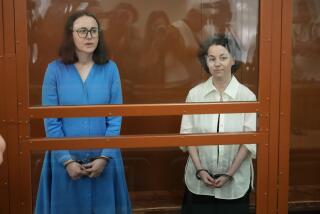Freedom Brings New Woes for Soviet Theaters : Stage: Government funds are slashed, and dramatists struggle with audiences unaccustomed to the new liberties.
- Share via
MOSCOW — Kama Ginkas, Moscow’s avant-garde theater director, used to joke that the Soviet government kept his controversial productions so tightly reined that the farthest his works could travel abroad was Estonia. But in the six years of perestroika , the formerly underground director has shown his plays from Italy to Israel and Chicago to Berlin, with great success and critical acclaim.
Although Ginkas and other top Soviet directors and playwrights have capitalized on these fledgling years of free expression and travel, they now face two unprecedented challenges: financial difficulties and a Soviet audience no longer certain of the role of theater in their lives.
If there was anything positive about the Communist government’s sponsorship of the arts in the Soviet Union, it may have been that theaters had a consistently adequate budget. No freedom-loving director would trade perestroika -era cutbacks in government spending for the age of censorship, but the situation does present some problems for the country’s 650 or so theaters. They are now asking firms and foundations for sponsorship, a new phenomenon in a land where everything was “Brought to You by the Communist Party” for more than 70 years.
“The process of sponsorship is under way, but it may take 20 years to solidify,” observes Alexander Svobodin, a high-ranking officer of the U.S.S.R. Theater Board and longtime theater critic.
Some of the new foundations are state-run, such as the Cultural Fund, of which Raisa Gorbachev is vice chairperson. Under the stewardship of the new minister of culture, Nicolai Gubenko, a former actor and director, the government has begun to accelerate its commitment to sponsorship. It has set up expert panels that scout theater talent throughout the Soviet Union and recommend one- or two-year commitments.
Svobodin, a panel member, says they also encourage municipal sponsorship of theater in the provinces and promote the idea of sponsorship to factories and other state or private businesses. An increasing number of sponsorships are joint ventures with foreigners, such as a musical theater studio in Moscow funded by a Soviet/Swedish group and a recent Austrian-sponsored Oscar Wilde production.
Theaters also face a unique financial quandary due to the country’s unconvertible currency. The problem is compounded when Soviets traveling abroad try to bring foreign actors and directors to the Soviet Union.
But the biggest problem has been the changing public attitude toward theater itself.
Ginkas says that audiences are temporarily limited by years of “genetic non-freedom” (although he adds that Soviet spectators are unusually appreciative and responsive to theater).
Moscow’s Pushkin Theater director, Yuri Yeriomin, says: “Our audience for 70 years consisted of suppressed, humiliated people who went to theater with great love because it was the only place where words of truth could be heard. It was not riddled with propaganda like the newspapers, radio, schools or workplace.”
Classics from both Soviet and world theater traditions are in fact sweeping across stages: three versions of “King Lear” in Moscow and Chekhov productions everywhere. Modern plays presenting previously taboo theatrical topics such as prostitution and even provocative stagings of classics seem to hit a pocket of discord with generally conservative Soviet audiences.
Most adult theatergoers are more than 40 years old and accustomed to government-approved standards. Referring to a play he mounted three years ago based on Dostoevsky’s “Notes From the Underground,” Ginkas says, “I realized it would shock the audience by the force of the work itself, but I was really shocked that the ignorant audience and critics saw only two things in this production: that the main character spits up food and that a naked woman washes herself on stage.” The director attributes this audience fixation to the tradition of heavily censored theater.
Contemporary Soviet theater is in a state of flux as it winds its way toward a new niche with its home audience.
While Soviet audiences catch up with the new expressions of theater in their country, Ginkas says, the theater artist’s task is to persevere. Renowned Russian dramatist Mikhail Roshin voices a similar prognosis: “Our theater must find a new lasting quality. It must be true to itself. We have great theaters, actors, directors and a rich dramatic tradition. We must move forward along our own lines.”
Director Yeriomin, on the future of Soviet theater, remarks, “I can’t help but recall Bergman’s film where the pastor, discovering no one’s at church but the organ player, proceeds with Mass anyway. Maybe art, like religion, should be addressed to a god of its own.”
More to Read
The biggest entertainment stories
Get our big stories about Hollywood, film, television, music, arts, culture and more right in your inbox as soon as they publish.
You may occasionally receive promotional content from the Los Angeles Times.










